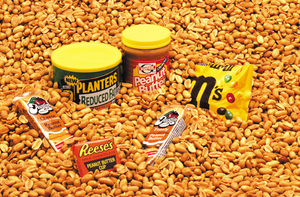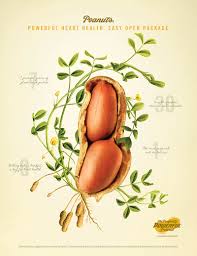
“While people love the flavor of peanuts, peanut butter, and other peanut products, they don’t always understand how nutritious and healthful they are,”says Sherry Coleman Collins, who discussed major health studies and the peanut industry's new ad campaign at the annual conference of the Southern Peanut Farmers Federation.

“People have a love affair with peanuts,” says Sherry Coleman Collins, “and that represents valuable capital for our industry.”

SHERRY COLEMAN COLLINS
But, she told growers and industry leaders at the annual conference of the Southern Peanut Farmers Federation, “While people love the flavor of peanuts, peanut butter, and other peanut products, they don’t always understand how nutritious and healthful they are.”
And there are widespread misconceptions about peanut allergy, often promulgated by those in the media who aren’t knowledgeable about the issues involved.
She says the National Peanut Board’s new media campaign, “The Perfectly Powerful Peanut,” speaks to consumer interests for purchasing foods offering health benefits.
STAY CURRENT on what’s happening in Mid-South agriculture: Subscribe to Delta Farm Press Daily.

ONE OF THE ADS in the National Peanut Board's "The Perfectly Powerful Peanut" promotion campaign.
Collins, a registered dietitian nutritionist who specializes in converting the science of nutrition into easy-to-understand “bite-size nuggets” for consumers and professionals, is a former National Peanut Board staff member and continues to consult as the board’s nutrition, food safety, and food allergy expert.
“Whether school kids or adults, people love peanuts,” she says, and this campaign is getting widespread attention about the health benefits of peanuts.”
The campaign takes a strikingly original approach to advertising with its use of hand-illustrated botanical art aimed at showcasing the authentic nature of peanuts as a plant-based source of nutrition.
“Most people don’t know how peanuts are grown, that they grow under the ground rather than on trees. They don’t know what peanut plants look like. This campaign uses excellent visuals to help people connect their food to the land. It’s a simple, beautiful message about the nutrition benefits — peanuts have more protein than any other nut — in weight management, heart health, and diabetes programs.”
Harvard health study: "incredibly powerful information"
A recent Harvard study developed “incredibly powerful information” about peanuts and health, Collins says. It included over 18,000 people, analyzing various epidemiological factors.

MAJOR STUDIES have shown the health benefits of peanuts. — USDA/ARS photo
“One of things they looked at was nut consumption,” Collins says. “The bottom line is that the more nuts people ate, including peanuts, the lower their risk of death from all causes. No matter the disease, they had a lower risk of death from that disease if they ate more nuts, including peanuts. This is a great story, and one that we need to leverage in our health information efforts.”
Salted, roasted peanuts have also been approved to use the coveted Heart Check symbol on promotional packages, she notes. “This symbol helps convey the message that this is food that’s good for your health.
“Another health study shows more than half of Americans are looking for ways to get more protein in their diets, and peanuts are protein dense — no nuts have more protein than peanuts. You can pack a lot of nutrition in each bite. They have more than 30 essential vitamins and nutrients. People are surprised when I tell them that peanuts are every bit as healthy as other nuts, and they want to know more.”
Studies have shown, Collins says, that 71 percent of American consumers consider health benefits when they buy food products. “Putting health benefits front and center is a major goal of our advertising campaigns, elevating the nutritional importance of peanuts above any other nut.
Confronting peanut allergy issues

BIRDSONG PEANUTS representatives attending the conference included, from left, Fred Garner, Suffolk, Va.; Bill Bullard, Blakely, Ga.; and Kelly Bennett, Bladenboro, N.C.
To deal with the peanut allergy issue, she says, the approach has been focused primarily on professionals: school nutritionists, dietitians, nurses, etc. “Our goal is to educate these professionals, who can then in turn educate their patients. We’ve achieved this to some extent, but not to the degree we’d have liked. Unfortunately, peanuts have become the poster child for food allergy — when people think of food allergies, the thing they think of first is peanuts.
“We want to change that; we want to help people realize that food allergy is an important issue, but peanuts aren’t the enemy — most people can enjoy peanuts with absolutely no health issues.
“We still have to contend with major misconceptions and myths being perpetuated in the media because people don’t have the right information about peanut allergy. In many cases, food writers and editors aren’t qualified to write about complex issues such as food allergies. Often those they interview aren’t qualified, so they end up spreading misinformation, and the more it’s published the more it appears to be true.
“Our goal, when these errors appear in the media, is to take steps to correct them and disseminate correct information.
Collins says the National Peanut Board conducted a survey of consumer perceptions on peanut allergies, and “One of things we learned is that Americans perceive that peanut allergies are about 40 times more common than they actually are. That’s a huge issue, and we need to fix that.
“Many people are also self-diagnosing peanut allergy, which is probably one of the reasons we’re seeing a huge disconnect between those who think they have peanut allergy and those who actually do have it.”
Many don't have needed medication

THE LOGO for the peanut industry ad campaign.
As many as 30 percent of respondents with school age children say they know someone who has had a severe reaction to peanuts, Collins says, and more than half of those who say they have someone in the household with peanut allergy don’t have epinephrine, the life-saving medication for those who actually do have a reaction to peanuts.
“While we’re working to offset all misconceptions about peanut allergies,” she says, “we’re increasing our efforts in three specific areas: case files, media, and consumers. We have an expanded school outreach program; in addition to working with school nurses and dietitians, we’re also trying to reach superintendents, school board members, and decision-makers at the top who can help us to offset these misconceptions.”
To help with this, Collins says, the peanut organization has a Patient Advisory Committee, which includes food allergy expects, researchers, National Restaurant Association food allergy specialists, and attorneys that specialize in school law.

ANOTHER AD in "The Perfectly Powerful Peanut" campaign.
“A new website, peanutallergy.com, will be a great resource for schools, families, health professionals, and consumers, to help dispel the myths related to peanut allergies. It emphasizes the message that ‘America’s peanut farmers care,’ and they are the ones funding this resource.
“We also monitor the media for common allergy misinformation. Every day, we address errors that appear in the media.”
“We have challenges, of course,” Collins says, “but there is a lot of opportunity for peanuts, and with the work of the National Peanut Board, we are more and more going to see consumer minds being changed.”
About the Author(s)
You May Also Like



